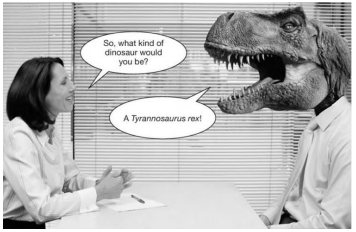Questões de Concurso Público IF-MA 2023 para Professor EBTT - Letras - Português - Inglês
Foram encontradas 10 questões
The tasks below are adapted versions of the activities, from the textbook, to work with the text. Match Tasks 1 – 6 with their main aim A – I. There are three extra aims which you do not need to use.
Tasks
Task 1 Discuss the questions in small groups.
1 Have you ever been to a job interview? How was the experience? What kind of questions did they ask you? Did you get the job?
2 What kind of questions do you expect to have in a job interview?
3 How can people get better prepared for a job interview?
Task 2 Look at the photo with the article. What do you think is happening? Do you think the question is one that someone might really ask in this situation? Why (not)?

Task 3 Read the article once and find out. How would you answer the question?
Task 4 Look at the highlighted words and phrases in the text. With a partner, try to figure out what they might mean and how you think they are pronounced.
Task 5 Read the article again. Using your own words, answer the questions.
1 What are extreme interviews? 2 What kind of companies first started using them? 3 Why do some people think that they are better than normal interviews?
Task 6 Do you think extreme interviews are a good way of choosing candidates? Which of the questions below (used in real interviews) do you think would work well? Why?

Adapted from: Face2Face Intermediate. Cris Redston and Gillie Cunningham. Cambridge University Press.
Main Aim
A. Integrating skills and personalizing the topic. B. Analyzing text organization. C. Inferring meaning of lexis from context. D. Predicting. E. Teaching grammar inductively using the text. F. Skimming. G. Activating schemata. H. Reading for details. I. Scanning.
Abstract Phrasal verbs are important for EFL and ESL education because of their high frequency, but can be difficult for learners because of their number and polysemy. While there are a number of studies on phrasal verbs, the widening focus of such studies has left a gap between theory and practical instruction. This study improves upon previous studies related to teaching phrasal verbs through cognitive linguistics by combining the theory of event conflation with corpus-based research to create a list of phrasal verb particles and meanings that is concise and yet comprehensive enough to account for approximately 95% of common phrasal verb meanings. It also reports the results of an experiment in which learners taught with this particle list improved more on pre-/post-tests of phrasal verbs than learners that studied a list of the most common phrasal verbs as whole entities (p<0.001, d=1.34). Quantitative and qualitative data presented in this study also indicate that learners taught with the particle list improved their ability to conjecture the meanings of novel phrasal verbs more effectively than learners who studied common phrasal verbs as whole units. Key words: Phrasal Verbs, Cognitive Linguistics, Corpus, Instruction Materials, TEFL, Second Language Acquisition.
Source: SPRING, Ryan. Teaching Phrasal Verbs More Efficiently: Using Corpus Studies and Cognitive Linguistics to Create a Particle List. Advances in Language and Literary Studies: Volume: 9 Issue: 5. 2018.
Regarding the genre “abstract” and the model above, choose the correct alternative.